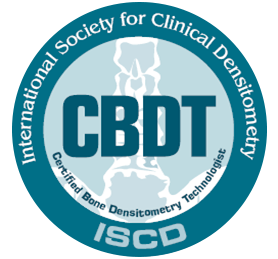

Certified Bone Densitometry Technologist (CBDT®)
Certified Bone Densitometry Technologist (CBDT®) is a professional certification accredited by the National Commission for Certifying Agencies (NCCA) in the field of bone densitometry for technologists who perform bone densitometry scans. The CBDT® credential signifies that an individual has passed an examination that has been designed to meet established certification industry standards and best practices. The CBDT® Exam is offered at computer-based PSI locations worldwide. The ISCD CBDT® examination consists of multiple-choice questions based on 5 Content Outline domains.
Apply Now Download Handbook Content OutlineELIGIBILITY – Must meet ALL requirements under 1 of the 3 eligibility options.
You are currently a CBDT, CDT or ARRT(BD)
- Hold a degree or certification in an allied health field from an accredited college or university.
- 3 months of DXA scanning experience.
- Performed no less than 100 central DXA patient scans at two skeletal sites (hip, spine, forearm).
- Document a minimum of 12 Category A OR 12 CME credits in skeletal health within the last 12 months. **Please note that credits are not required to come from ISCD sources.
- 3 months of DXA scanning experience.
- Performed no less than 100 central DXA patient scans at two skeletal sites (hip, spine, forearm).
*See full requirements specified on page 4 in the CBDT® Handbook.


APPLICATION PROCESS
All communication with candidates will be via email only. The name on the application MUST match the candidate’s ID, and the application MUST be complete with application fee and a signature from the candidate’s supervisor. Candidates are required to read the following statements and agreements in full and digitally sign their agreement to all statements listed within the document.
Once the application has been reviewed and accepted, candidates will be sent an eligibility confirmation through email from PSI (no-reply@psiexams.com). After receiving the eligibility email, the candidate may schedule their appointment.
WHAT TO EXPECT
The CBDT® Exam is offered at computer-based PSI locations worldwide. The ISCD CBDT® examination consists of multiple-choice questions based on 5 Content Outline domains. The CBDT® examination will have a total of 150 multiple choice questions, 125 scored and 25 pretest questions. Of the 125 scored questions, 25 will be case-based multiple choice questions.
125
Scored Questions
25
Pretest Questions
3.5
Hours to Complete
5
Content Domains
PREPARING FOR YOUR EXAM
There is no official course or study material that is recommended before taking the exam, however, the Quality Bone Densitometry (QBD) Course does covers many of the areas in the Exam Content Outline. Taking the QBD course is not required, nor is completion a guarantee that an applicant will pass the certification exam, but the course does provide foundational knowledge related to clinical densitometry. We do not currently have any other study resources to offer. Content Outline.
FEES Schedule
Full & Professional Members Receive Discounts
Full & Professional members receive discounts If you are interested in upgrading to a professional or full membership to receive discounts on all certification related fees, click here to learn more about the additional member benefits associated with those tiers of membership.
APPLY NOW Join NowExam Cancellation and “No Show” Policy*
You may request to cancel your CBDT exam registration for a refund, minus a $50.00 administrative fee. Please email certification@iscd.org. Individuals who are a “No Show” for scheduled exams will need to pay an $80 no show fee before being able to schedule a new exam.
EXAMINATION RESULTS
Candidates will receive their unofficial score report upon completing the exam. The score report will not include performance on pretest questions, and these questions will not be used to determine passing or failing. Newly certified professionals will appear on the ISCD’s website certification registry within two weeks of successfully passing the exam. Certificates are now accessible to download in the My Certifications section of the user’s “My ISCD” page after logging in from the ISCD home page. A printed copy of certificates will no longer be mailed but can be requested for a small fee of $10 USD. Please reach out to certification@iscd.org to request a printed copy.
EXAMINATION DEVELOPMENT
A job analysis (sometimes referred to as a practice analysis, job task analysis, role delineation study, work analysis, or competency profiling) is a scientific inquiry conducted to identify the tasks and work activities conducted, the context in which those tasks and activities are carried out, and the competencies (knowledge areas, skills, and abilities) required to perform a job role successfully. Different methods can be used which may differ in the levels of specificity in analyzing and describing different work elements, with the choice of method largely dependent on the intended purpose and use of the results. The methodology of the current job analysis was tailored to the creation of exam specifications for test development.
The job analysis was conducted in accordance with principles and practices outlined in the Standards for Educational and Psychological Testing, which describe principles and guidelines for all aspects of test development, including content validation.
FREQUENTLY ASKED QUESTIONS
Any technologist who performs human bone densitometry scans and meets the eligibility requirements as specified in the CBDT® Handbook
You must wait 30 days from your fail date to submit the re-take application. The re-take application will be emailed to you along with a copy of your Score Report. This application may ONLY be used if you did NOT pass the examination AND you are applying to sit for the exam within one year from the original failed exam date. A candidate may sit for the exam up to three times within one year from the original failed exam date. Thereafter, if they are still unsuccessful in passing the exam, the candidate must show documentation of an additional 12 hours of CME Category 1 or Category A CE credits in the field of musculoskeletal health and bone densitometry in order to meet the eligibility requirements to sit for the exam again. Please note that the 12 hours of CME are not required to come from ISCD courses.
The CBDT® certification is valid for five (5) years.
Information on how to schedule your examination at a PSI test center will be included with your eligibility email from no-reply@psiexams.com to schedule your exam.
PSI TEST LOCATIONSISCD is committed to allowing candidates the opportunity to appeal decisions during the professional credentialing process. ISCD staff and the ISCD Certification Council are responsible for handling all appeals and requests in a confidential, timely and fair manner. Every effort is made to ensure that the ISCD examination procedures are reasonable and that fair and equitable treatment is accorded to all applicants. To ensure fairness and a right of redress in the evaluation and processing of applications, examination procedures, and certification activities, the ISCD Certification Council has established a formal appeals procedure which you must follow for an appeal of ISCD’s policies, requirements, or decisions. All decisions and actions shall be transmitted in writing and shall contain a brief notice of the right of appeal. For Appeal instructions and form please contact certification@iscd.org.

